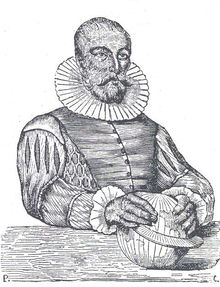
Back بيدرو نونيز Arabic بيدرو نونيز ARZ Pedru Nuniş Azerbaijani Педру Нуниш Bulgarian Pedro Nunes Catalan Pedro Nunes Czech Pedro Nunes German Pedro Nunes (geografo) Esperanto Pedro Nunes Spanish Pedro Nunes Basque
Pedro Nunes | |
|---|---|
 Pedro Nunes, 1843 print | |
| Born | 1502 |
| Died | 11 August 1578 (aged 76) |
| Nationality | Portuguese |
| Occupation(s) | Mathematician, cosmographer, and professor |
| Signature | |
 | |
Pedro Nunes (Portuguese: [ˈpeðɾu ˈnunɨʃ]; Latin: Petrus Nonius; 1502 – 11 August 1578)[1] was a Portuguese mathematician, cosmographer, and professor, probably from a New Christian (of Jewish origin) family.[2][3][4]
Considered one of the greatest mathematicians of his time,[5] Nunes is best known for being the first to approach navigation and cartography with mathematical tools. Among other accomplishments, he was the first to propose the idea of a loxodrome (a rhumb line), and was the inventor of several measuring devices, including the nonius (from which the Vernier scale was derived), named after his Latin surname.[6]
- ^ "The Galileo Project".
- ^ Martins, Jorge, Portugal e os Judeus (3 vol.), Nova Vega, Lisboa, 2006, ISBN 972-699-847-6
- ^ Leitão, Henrique, "Para uma biografia de Pedro Nunes: O surgimento de um matemático, 1502-1542", Cadernos de Estudos Sefarditas, 3 (2003) 45-82.
- ^ J J O'Connor (November 2010). "Pedro Nunes Salaciense". Retrieved 2015-11-20.
- ^ Pedro Nunes (1502-1578)
- ^ O'Connor, J. J.; Robertson, E. F. (November 2010). "Biography of Pedro Nunes Salaciense". School of Mathematics and Statistics, University of St Andrews, Scotland. Retrieved 2014-04-08.